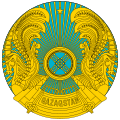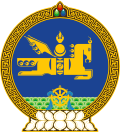Kazakhstan–Mongolia relations
 | |
Kazakhstan |
Mongolia |
|---|---|
| Diplomatic mission | |
| Kazakh Embassy in Ulaanbaatar | Mongolian Embassy in Astana and Almaty |
Kazakhstan–Mongolia relations refer to bilateral relations between the Republic of Kazakhstan and Mongolia. The two countries established diplomatic relations on 22 January 1992, after Kazakhstan gained independence from the Soviet Union.
The Embassy of Mongolia to Kazakhstan, Almaty opened in September 1992 and began operating in Astana in 2010. The diplomatic mission of Kazakhstan to Mongolia opened in 1992 in Ulaanbaatar. The mission was upgraded to an Embassy on 1 January 2007.[1]
History
[edit]While formal state relations were established only in the 1990s, cultural and historic relations between the two countries go back centuries.[2][3] The two share a common Turco-Mongol tradition, both share a common Ancient East Eurasian lineage, and both had been within the nucleus of the Mongol Empire under the lead of Genghis Khan, whose identity has been disputed between them in modern day.[2] In the 17th to 18th century, the Kazakh-led Kazakh Khanate fought wars against the Mongol-led Dzungar Khanate; ultimately, both khanates were destroyed by the Chinese and Russians.[4][5]
Both of what are now Kazakhstan and Mongolia had been ruled by Qing China and Tsarist Russia, and both countries were formerly Eastern Bloc countries. Today they share similar experiences with relations with Russia and China. Citizens of both countries, holding diplomatic, official, and ordinary passports, enjoy visa-free travel. In addition, both the Kazakh and the Mongolian languages are officially written in the Cyrillic alphabet, using identical letters.
Political cooperation
[edit]In October 1993, then-President Nursultan Nazarbayev paid his first official visit to Mongolia.[1][6] The Protocol on Cooperation between Khural of Mongolia and Mazhilis of Kazakhstan was signed in 2003. The first official visit of Mongolian President Natsagyn Bagabandi to Kazakhstan occurred in 1998. Nazarbayev was awarded the highest honor of Mongolia, the Order of Erdene Ochir ("The Precious Rod"), for his contribution to the development of bilateral relations during his official visit to Mongolia in the summer of 2008.[6] Since the establishment of diplomatic relations in 1991, the two countries have signed more than 50 bilateral treaties and agreements.[1][6]
In October 2019, Mongolian Prime Minister Ukhnaagiin Khürelsükh visited Nur-Sultan and met Kazakh Prime Minister Askar Mamin. It was the first visit by a Mongolian Prime Minister in 25 years.[7]
In October 2021, Minister of Foreign Affairs of Mongolia Batmunkh Battsetseg visited Nur-Sultan and met Kazakh President Kassym-Jomart Tokayev.[8]
Trade and economic relations
[edit]Kazakhstan-Mongolian Intergovernmental Commission (IGC) on Trade, Economic, Scientific, Technological and Cultural cooperation was established to strengthen bilateral cooperation. Trade turnover in 2017 reached US$68.2 million, according to the Ministry of Finance of the Republic of Kazakhstan.[1]
The main export goods from Kazakhstan to Mongolia are tobacco, cigarettes, lighters, sanitary and hygiene products, wheat and wheat-rye flour, and oil.[1]
The main import goods of Mongolia to Kazakhstan are animal and vegetable products, textiles and textile products, wood, timber, pulp, and paper.[1]
Aerospace
[edit]Kazakhstan’s aerospace cooperation with Mongolia expanded in 2024 with the signing of a contract to export a medium-resolution satellite to a Mongolian private company. This deal marked Kazakhstan’s first satellite export and added to an initially domestic satellite constellation project. The launch of the Mongolian satellite is expected around 2028. On 10 April 2025, Kazakh officials highlighted broader international collaboration in space technologies, including ongoing negotiations within the UN framework.[9]
Cultural and humanitarian cooperation
[edit]Some 10 agreements have been signed between Mongolia and Kazakhstan.[10] Programs include exchange students program and in 2001, the East Kazakhstan State opened its branch in the city of Ulaanbaatar. 25 grants were awarded annually to citizens of Mongolia. The Kazakhstan government provided humanitarian aid of US$200,000 to the victims of the mud flow that happened on July 10, 2016.[11]
See also
[edit]References
[edit]- ^ a b c d e f "Kazakhstan - Mongolia". mfa.gov.kz.
- ^ a b https://qalam.global/en/articles/some-remarks-on-the-history-of-the-kazakhs-en
- ^ https://oxfordre.com/asianhistory/display/10.1093/acrefore/9780190277727.001.0001/acrefore-9780190277727-e-443?p=emailA4eLjCgZZHiJo&d=/10.1093/acrefore/9780190277727.001.0001/acrefore-9780190277727-e-443
- ^ https://kipchaks.com/steppe-lords-the-dzungar-perspective-on-the-centuries-long-war-with-the-kazakhs/
- ^ https://history-maps.com/story/History-of-Kazakhstan/event/Final-Struggle-Kazakhs-and-the-Fall-of-the-Dzungar-Khanate
- ^ a b c "Bilateral relations". mfa.gov.kz.
- ^ "Mongolia and Kazakhstan to upgrade their relations". news.mn. 2019-10-10. Retrieved 2021-12-06.
- ^ "Tokayev receives Mongolian Foreign Minister". Kazakhstan Today. 2021-10-13. Retrieved 2021-12-06.
- ^ "Kazakhstan Expands Aerospace Ambitions with New Export Projects and Scientific Advances". Astana Times. 12 April 2025. Retrieved 14 April 2025.
- ^ "Cultural and humanitarian cooperation". mfa.gov.kz. Archived from the original on 8 April 2019.
- ^ "Kazakhstan - Mongolia". mfa.gov.kz. Archived from the original on 10 February 2020. Retrieved 2023-12-19.

